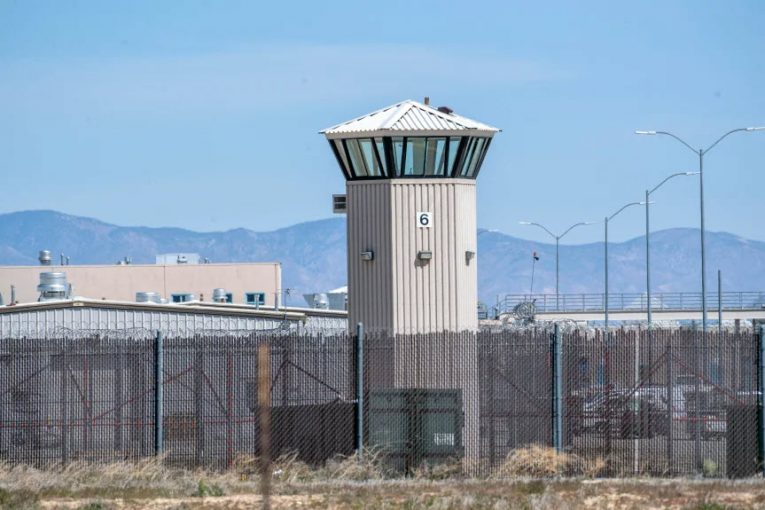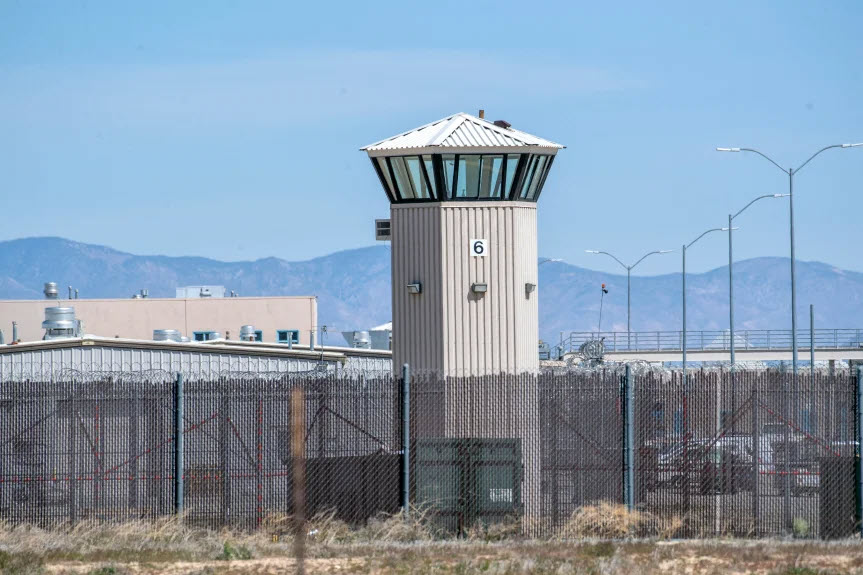

The ballot initiative, supported by police, corporations, and even big grocery chains, would use more taxpayer money to incarcerate people, rather than invest in other social services.
By Ray Levy Uyeda
A proposition on California’s November ballot could weaken years of reforms to the state’s criminal legal system by reclassifying misdemeanor theft charges as felonies.
Opponents of Proposition 20 say that if passed, the state’s carceral system would balloon. In a letter sent last month to the mayors of more than a dozen California cities, a coalition of victims’ rights organizations wrote that as many as 10,000 more people could end up incarcerated in the state’s prisons and jails—and taxpayers would foot the bill.
The letter also argues that reducing the number of people in California’s prisons and jails has freed up money to create more than a dozen trauma recovery centers for victims. Sophora Acheson, executive director of Ruby’s Place, which signed the letter, said that people from all economic backgrounds suffer from violent crime, but low-income people simply don’t have the resources to move or seek medical and mental health care. Victim  services help create a safety net for low-income survivors of crime, she said.
services help create a safety net for low-income survivors of crime, she said.
“They are literally trading victim services for more incarceration,” Acheson, who is a survivor of childhood domestic abuse and sexual violence, said of the ballot measure’s supporters.
Proposition 20 would roll back Propositions 47 and 57, both of which California voters approved in the last decade. Together, the two ballot items helped to reduce the number of people incarcerated in state prisons, increase funding for victim services, and begin to ameliorate the impact of a tough-on-crime policy mentality that targeted Black and Latinx people.
Opponents to the proposition have raised more than $6.5 million from wealthy progressive donors, including Patty Quillin. Quillin is the director of Meadow Fund, a donor-advised fund of the Silicon Valley Community Foundation. The foundation has given to The Justice Collaborative, which sponsors The Appeal, through Tides Advocacy.
Major donors in support of Proposition 20 include a police union, a PAC benefiting Republican Representative Devin Nunes of California, and an energy corporation. Supporters argue that the ballot measure will prevent “organized retail crime,” an industry term to describe coordinated theft, and that it will keep communities safe by increasing penalties for those convicted under the revised legislation.
Large grocery chains, like Safeway, Costco, and Ralphs have collectively donated hundreds of thousands of dollars to promote Proposition 20’s passage. Costco said that it is no longer supporting Proposition 20 and requested a refund of their $50,000 contribution last year. Neither Safeway nor Ralphs responded to The Appeal’s request for comment on why they are supporting the ballot measure.
In the summer, amid a national reckoning with the systems that criminalize people of color, immigrants, and low-income people, the same grocery store chains released statements of support for corporate accountability. “We are committed to listening, learning and doing better as a company to support the advancement racial equity and justice,” Ralphs Grocery said in a tweet.
Acheson said the bill intends to invoke fear during a time of considerable upheaval, which could deter voters from the fact that incarceration is costly and ineffectual. The California criminal legal system is a $50 billion industry, she noted, and of that sum, just 1 percent goes toward victim services such as trauma recovery centers, of which there are 15 across the state.
Diana Becton, the district attorney for Contra Costa County, said Proposition 20 “is going to slash funding from what is and has been working.” Moreover, the savings to public funding made possible by previous reforms to the state’s carceral system have been significant. “They have gone into programs [and] funding to have staffing and services available for victims of crime and the other  critical priorities [like] schools,” Becton said.
critical priorities [like] schools,” Becton said.
California is just one of many states across the country that has begun to re-evaluate punitive policing and incarceration, both because of the cost to taxpayers and because incarceration just has not led to lower crime rates or healthier communities.
In New Jersey, Governor Phil Murphy is expected to sign a slate of legislative proposals that includes ending mandatory minimum sentences for drug-related charges. The change would retroactively apply to those currently incarcerated, 2,000 of whom would be immediately eligible for parole.
In Mississippi, the Republican-controlled legislature passed a bipartisan act that would have released thousands from state prisons who were convicted for violent crimes and made eligible for early parole under the act’s guidelines. In August, Gov. Tate Reeves vetoed the legislation.
Tinisch Hollins, the California state director for Crime Survivors for Safety and Justice, which also signed the letter, said the proposition is about protecting property over supporting Black and Latinx communities, which are already overpoliced and overrepresented in prisons and jails. These are the same companies, Hollins said of the grocery chains, “that profit off of our communities.”
“We buy our groceries [from them] and feed our families,” Hollins said. “It’s really disgusting and an insult to our intelligence that this approach could benefit any one of us in a way that’s gonna help us stay safe in our community.”
In order to support public health and community well-being, Hollins said that the state needs to spend public money on systems, services, and programs that “actually address the cause, as opposed to loading all of our resources into the response.”
Originally published in the Appeal.
To sign up for our new newsletter – Everyday Injustice – https://tinyurl.com/yyultcf9
Support our work – to become a sustaining at $5 – $10- $25 per month hit the link:




